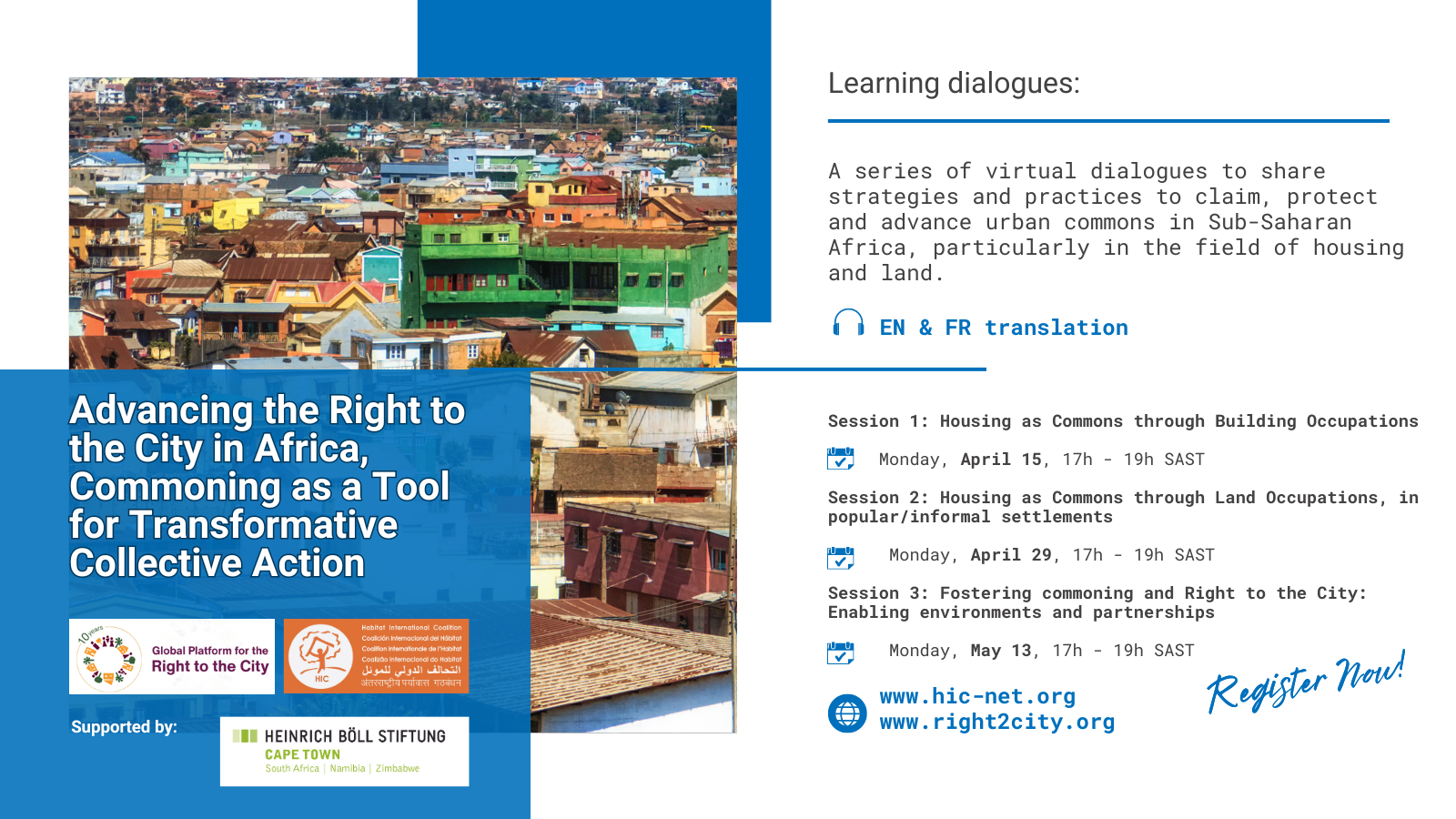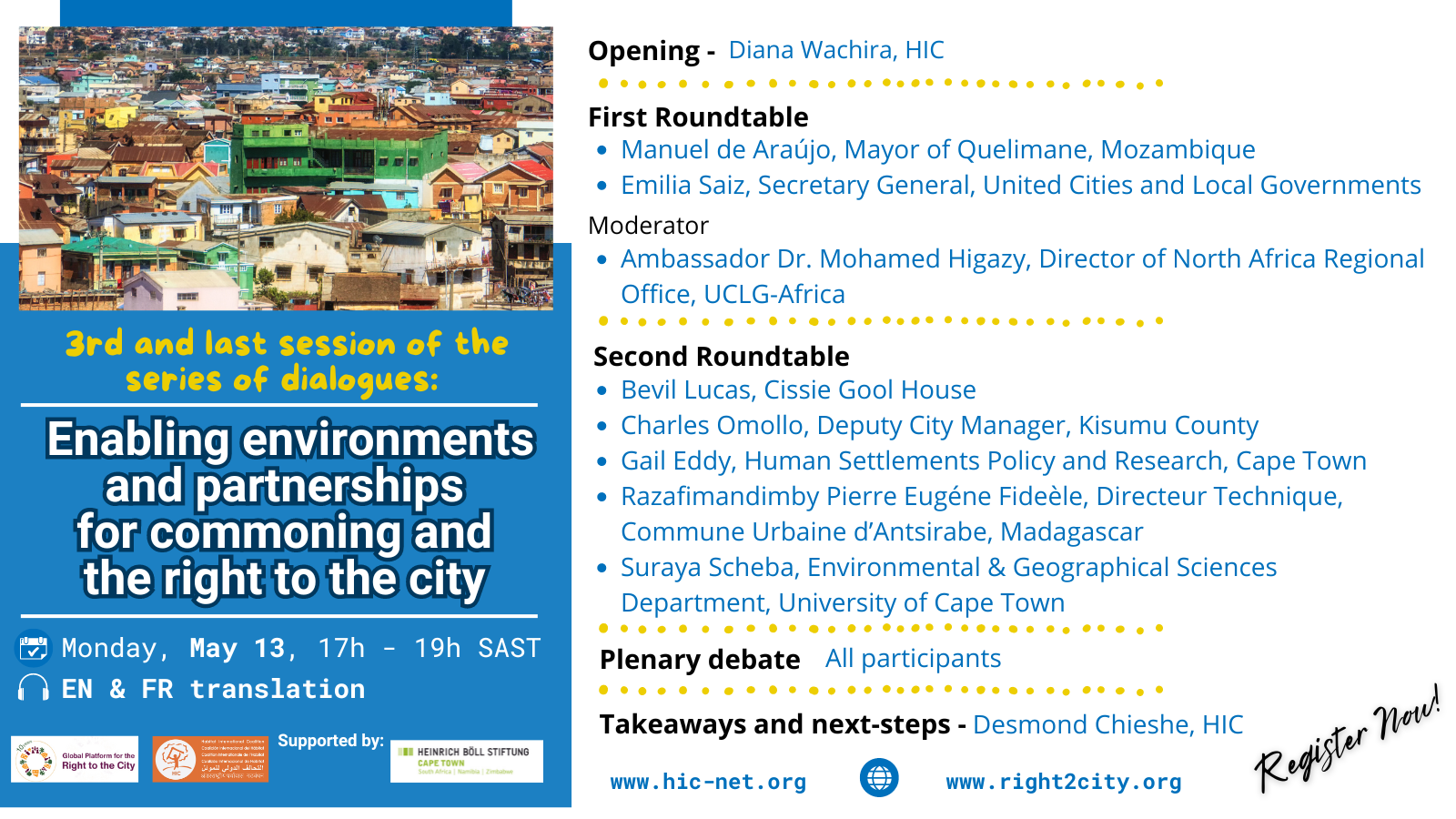
Why are commoning initiatives a solution to the challenges faced by cities in Sub-Saharan Africa?
Cities and human settlements in Sub-Saharan Africa face profound challenges stemming from rapid urbanization, socio-economic disparities, and spatial injustices. Increased privatization and commodification of housing and land, exponentiated by a background of colonial and/or apartheid spatial planning and regulations, lead to evictions and displacement, especially among communities living in situations of socio-economic and spatial marginalisation. However, amidst these challenges, commoning initiatives, with a right to the city approach, represent not only a direct response to this scenario, but also a radical alternative to the systems in place.
Commoning represents a form of organization for social wellbeing, differentiated both from private and public models, committed to the non-commodification (non-privatization) and collective management of vital resources such as housing, land and basic services. These initiatives, often driven by civil society groups and grassroots movements, seek to reclaim public spaces, challenge profit-driven development, and foster community-driven solutions, offering a pathway towards socio-spatial justice and democratic governance. Through collaborative efforts and dialogue between local actors and global networks, commoning initiatives hold the potential to empower communities, address inequalities, and build more inclusive and sustainable urban environments across Sub-Saharan Africa.
Join a series of learning dialogues to exchange strategies on the urban commons in Africa
To amplify these collaborative efforts, we invite you to a series of virtual dialogues to share strategies and practices to claim, protect and advance urban commons in Sub-Saharan Africa. As a starting point, these dialogues will focus on the potential held for commoning practices linked to housing and land as to foster community organisation and access to housing through non-market based approaches.
The invitation is open to all, while noting that the dialogues will be centred around participatory discussion and thus particularly targeted towards the exchange between social movements and civil society organisations based or working in Sub-Saharan Africa.
A participatory approach will be used, based on presentations of cases and collective discussion, as to advance towards a joint interpretation of what commoning for housing and land can mean in Sub-Saharan Africa.
In this first cycle, a particular focus will be given to cases from Southern Africa, engaging with them from the perspectives of different countries of Sub-Saharan Africa.
The sessions will take place every two weeks on Mondays, forming a continuous and complementary learning and exchange cycle. These dialogues are organized by the Habitat International Coalition (HIC) and the Global Platform for the Right to the City (GPR2C), with the support of the Heinrich Boll Foundation’s Southern Africa Office.
Sessions and Dates
Session 1- Housing as commons through buildings occupations
How can commoning approaches contribute to housing movements engaged in the occupation of buildings within urban centers, which are then reclaimed as commons for collective housing management? How do we organize and sustain a community of commoners within this context, including principles, rules, strategies and everyday life considerations?
Date:
Monday, April 15th, 17h – 19h SAST (check your local time here).
Focus cases
- Cissie Gool House, Cape Town, South Africa.
- Building Occupations in urban centres in Brazil.
Session 2: Housing as commons through land occupations, in popular/informal settlements
How can a commoning approach intersect with processes aimed at advancing recognition, formalization, land titling, and upgrading initiatives in popular/informal settlements? Furthermore, in what ways do these commoning strategies differ from the approaches typically utilized in building occupations?
Date:
Monday, April 29th, 17h – 19h SAST (check your local time here)
Focus cases
- Informal settlements and land occupations in Nairobi, Kenya.
- Informal settlements and land occupations in Johannesburg, South Africa.
Session 3: Fostering commoning and Right to the City: Enabling environments and partnerships
How to build and enlarge a community of commoners? What roles can public-community partnerships play in addressing shared and diverse challenges? How do these dynamics feature and differ in the diverse social, political and economic contexts of Sub-Saharan Africa?
Participatory methodology including roundtable conversations with representatives of different sectors.
Date: Monday, May 13, 17h – 19h SAST (check your local time here).

Registration
Please, ensure your participation by filling this registration form.
Due to the continuous and complementary learning and exchange format of the dialogues, participation in all sessions is recommended. Sessions will count with interpretation in French and English.
For more information or if you have any questions, please contact: contact@right2city.org


